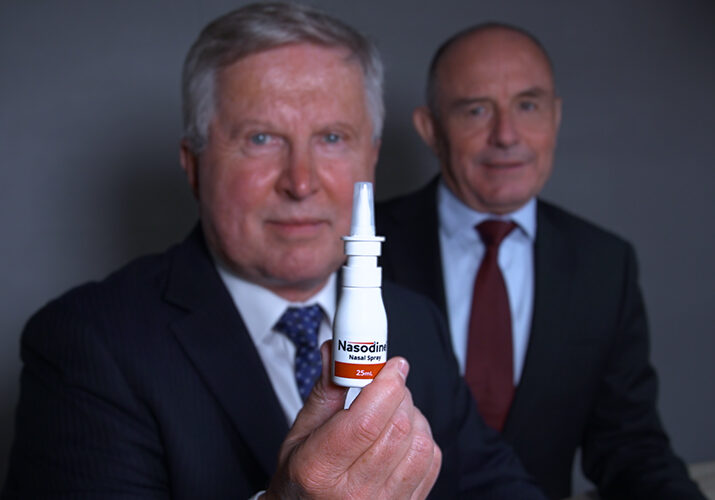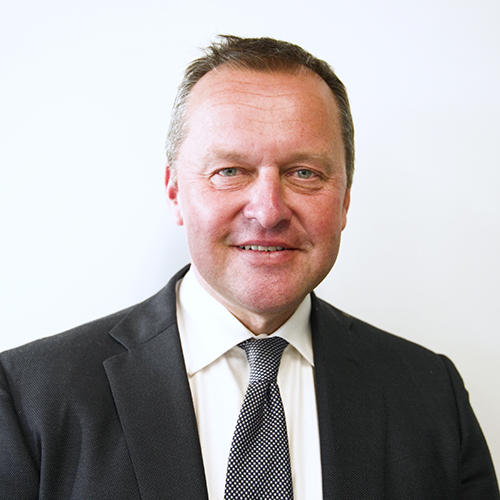
About

Firebrick Pharma was founded by Peter Molloy and Stephen Goodall (picture) in 2012 with the mission to develop a nasal spray based on povidone-iodine (PVP-I) for use as a treatment for the common cold. PVP-I is known to kill (completely inactivate) all respiratory viruses and bacteria, with no potential for resistance. The challenge was to create a formulation and product package that was stable at the low concentrations needed for safe nasal use, while also meeting the high manufacturing and quality standards needed for pharmaceutical approval.
Over several years working in a laboratory in Parkville Victoria, they succeeded in developing a 0.5% PVP-I nasal spray formulation in a custom bottle/pump design that was well tolerated and stable, They called "Nasodine Nasal Spray". In 2015, Firebrick was granted its first Nasodine patent titled "Treatment and prevention of the common cold using povidone-iodine".

Nasodine Nasal Spray currently available in Singapore
Independent viral inactivation studies showed that Nasodine rapidly killed all known respiratory viruses - most completely eliminated in less than 60 seconds of contact. A study at the Basil Hetzel Institute in Adelaide Australia showed that using a sensitive human nasal tissue model, the nasal formulation was safe for nasal use, even with long term (30 minutes) exposure..
Nasodine then entered human clinical studies and between 2018 and 2023 was assessed in a series of independently controlled studies, including a Phase 1 study to confirm safety in adults, followed by three Phase 2 studies (one in common cold, two in COVID-19) and finally in 2019, a Phase 3 study that confirmed safety and efficacy in people with the common cold.
In 2020, Firebrick filed a dossier with the Australian drug regulator seeking approval of Nasodine as a treatment for the common cold. However, the review was complicated by the advent of COVID-19 and after an initial rejection by the Australian regulator and two appeals by Firebrick seeking to have that rejection overturned, finally in 2023, Firebrick decided to launch Nasodine directly into international markets and no longer rely on Australian approval.
In 2024, Firebrick successfully completed commercial-scale manufacturing of Nasodine and the product was launched in the USA in April and in Singapore in June 2024. In 2025 and 2026, the company expects to see the product introduced into other international markets.
Today, Firebrick is leading the world in the development of novel formulations and uses of PVP-I. Nasodine is the company's premier product, and is the only PVP-I nasal spray that is supported by a decade of R&D, proven safety in controlled human clinical trials, and a growing list of peer-reviewed publications.
Our history
-
2012
Firebrick Pharma incorporated by Peter Molloy and Stephen Goodall with the mission to create a broad-spectrum antimicrobial nasal spray based on povidone-iodine (PVP-I).
-
2013
Product development commences.
-
2014
Australian patent filed.
-
2015
Australian patent granted and international patent filings commence. Formulation development commences in Melbourne laboratories.
-
2016
Series A funding closes; product development accelerates.
-
2017
Product formulation, packaging and manufacturing development completed; viral inactivation studies confirm Nasodine rapidly kills all respiratory viruses.
-
2018
Safety testing in human nasal epithelial model shows Nasodine is safe for nasal use. Series B funding closes. Phase 1 and Phase 2 trials completed.
-
2019
Series C funding, Phase 3 trial of Nasodine as a treatment for the common cold completed in 260 subjects. New patent filed.
-
2020
Series D (pre-IPO) funding closes; Australian registration dossier filed for Nasodine; several new patents granted.
-
2021
Pilot Phase 2 trial in patients with COVID-19 completed; shows that single dose of Nasodine reduces SARS-CoV-2 viral shedding for up to 4 hours.
-
2022
Firebrick Pharma listed on the Australian Securities Exchange (ASX) under the ASX code “FRE”.
-
2023
Phase 2 randomized controlled multi-dose trial in COVID-19 patients achieves primary endpoint; shows that Nasodine dosing 8 times daily over 3 days leads to 100% clearance of SARS-CoV-2 from the nasal passages.
-
2024
Nasodine Nasal Spray launched in USA and Singapore.
-
2025
Retail pharmacy launch of Nasodine Nasal Spray in Singapore through the Guardian Pharmacy Group; first successful patent defence against competitor nasal spray.
Our values
Science based
To deliver evidence based, effective products to market.
Positivity
Firebrick is an exciting and fun company to work for. We have a can-do spirit and are future focused. We believe that success comes to those who are enjoying what they are doing.
Integrity
We uphold the highest standards of integrity. We are honest, ethical and transparent.
Responsibility
The health and safety of our consumers is always at the fore and we are committed to delivering high quality products. We strive to uphold strong ESG principles (Environmental, Social & Governance) in our operations and decision making.
Innovation
We are courageous, reward creative thinking and applaud experimentation. We strive to generate new solutions to unmet needs.
Teamwork
Our culture is based on openness, tolerance and collaboration. We are flexible, respectful and recognise that we achieve more when we work together.
Firebrick board and management
Peter Molloy
Founder & Executive Chairman, BSc, MBA, PhD
Peter Molloy is a qualified microbiologist and biochemist who built a successful career in the pharmaceutical industry, initially at Faulding (Aust) and then at Pharmacia (Pfizer), where he was Managing Director of Australia/NZ operations and later International Vice President for Strategic Marketing. During his career, he launched 23 new pharmaceutical products and executed 40 international licensing or distribution deals. Subsequently, he was CEO of four biotech companies in US and Australia, including two ASX-listed firms. As CEO of antiviral drug development company, Biota Holdings Limited (2002-2005), the company’s market value grew from $30m to around $300m. Subsequently, as founding CEO of Race Oncology (2016-2020), the company's market value grew from $12m to more than $400m during 2021. He obtained his BSc from University of Melbourne, his MBA from University of Adelaide, and he holds a PhD in biotechnology business. He is also a Fellow of the Australian Institute of Company Directors.
Stephen Goodall
Founder, Director & COO, BAppSc, MAppSc, MBA, PhD
Stephen Goodall has a successful track record in intellectual property, pharmaceutical development, manufacturing, regulatory strategy and clinical development. He was instrumental in developing the intellectual property that underpins the Firebrick patent. Previously, he was Chief Operating Officer of Viralytics, which was later acquired in 2018 for $500 million by the US big pharma company, Merck. Prior to Viralytics, he was the Director of Pharmaceutical Development at Vapotronics, where he managed all aspects of inhaled drug development and formulation and before that, Director of Development at AGEN Biomedical for 11 years. He is a founder of Firebrick and co-inventor on Firebrick patents. He has extensive experience in the preclinical, IND, regulatory and human clinical phases of drug development. He also has an impressive background in process development, production scale-up and GMP manufacturing for pharmaceuticals.
Simon Tucker
Chief Scientific Officer, BSc (Hons), PhD
Dr Simon Tucker is a virologist with decades of pharmaceutical R&D management experience. He previously led teams at GD Searle (US) focused on new antivirals including influenza and HIV, where he was a member of the team responsible for the discovery of the HIV protease inhibitor, amprenavir. He subsequently led the Gene Therapy Group at the University of Glasgow (UK), before joining Biota Pharmaceuticals, the world-leading antiviral drug developer at the time. As Vice President of Research at Biota he oversaw the research and IP portfolios, managed the R&D strategy and execution, and was directly involved in multiple licensing deals, collaborative projects with major pharmaceutical companies and the discovery and progression of clinical candidates. He led the teams that discovered zanamivir (Relenza), the world’s first neuraminidase inhibitor for treatment of influenza, as well as the world’s first point of care diagnostic test for influenza A and B. He also presided over the discovery and development of candidate drugs for the common cold (vapendavir), RSV and hepatitis C. He is a founder & former CEO at 360biolabs and is currently Chairman of Jumpstart-Fertility, an international biotech focused on drugs to address female infertility.
Rick Legleiter
Non Executive Director
Rick Legleiter's expertise spans a broad range of critical business functions, including healthcare go-to-market growth strategies, corporate governance, and capital raising. He brings significant experience in investor relations, M&A, and post-merger integration. With a focus on international expansion and business transformation, Rick is adept at navigating complex challenges, particularly in transitioning organisations from an R&D-driven culture to a commercial-focused business. He is committed to contributing to CEO and Board deliberations by leveraging a deep understanding of global markets, risk management, and stakeholder engagement to drive sustainable growth and deliver shareholder value.
Monique Baldwin
Head of Regulatory Affairs, BSc (Hons), MBioethics, PhD
Dr Monique Baldwin is a highly experienced regulatory affairs professional with a track record of success across multiple therapeutic areas, covering small to large multinational pharmaceutical companies (Novartis, GSK, CLINUVEL, CSL). Monique has a PhD in Life Sciences from the University of Newcastle and a master’s degree in Bioethics from Monash University. Responsible for the development and implementation of local and global regulatory strategies, Monique has worked closely with drug substance and drug product manufacturers, supported clinical programs across several international regulatory jurisdictions. Monique is passionate about ethics, which has led to her participation in research ethics (public and private healthcare institutions), and ongoing educational interests in bioethics at an academic level.
Kam Watson
Marketing Administration Manager
Kam Watson is a strategic marketeer with over 20 years global experience spanning consumer goods and pharmaceuticals. Her expertise includes end-to-end product launch planning and strategic marketing execution helping to bring innovative healthcare solutions to market and drive sustained brand growth. Holding a postgraduate in marketing, she has built a career around transforming insights into actionable strategies from HCP engagement to multichannel campaigns always with a focus on compliance, collaboration and patient impact. Kam is passionate about leading cross-functional initiatives that bridge science and marketing to create real commercial and clinical value.












